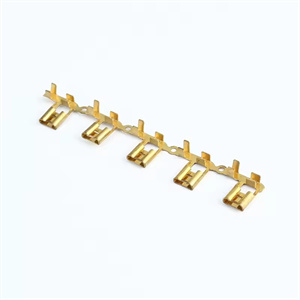Terminal connectors and relays play different roles in electrical systems, and there are obvious differences between them.
Terminal connectors, also known as wire buckle terminals or electrical connectors, are mainly used to connect wires, ensuring that the wires are fixed on the terminals and providing reliable electrical connections. Its characteristic is easy and fast installation, without the need for welding or screw fixation, and can be inserted and removed multiple times, making it convenient for maintenance and replacement of wires. In addition, some wire buckle terminals also have waterproof, dustproof, and corrosion-resistant characteristics, suitable for applications in harsh environments. In the electrical connections of household appliances such as washing machines, refrigerators, air conditioners, etc., wire buckle terminals have been widely used.
A relay is an electrical control device that controls a larger current by controlling a smaller current, achieving a predetermined step change in the controlled quantity in the electrical output circuit. Relay is commonly used in situations where high-power electrical equipment needs to be controlled, such as electric motors, lighting equipment, refrigeration air conditioning, etc. In control systems, relays play an important role in avoiding issues such as overcurrent and circuit short circuits.
In summary, terminal connectors are mainly used for wire connections and providing electrical connections, while relays are used to control the current in electrical equipment. They each play different roles in the electrical system and meet different application requirements.
Electronic Precision Brass Terminal Connectors offer the following features and benefits:
High-precision manufacturing: the precise machining process is adopted to ensure that the size and shape precision of the terminal connector is very high, which can meet the strict requirements of electronic equipment on connection precision.
Good conductivity: Brass has good conductivity and, although slightly inferior to copper, provides stable and reliable current transmission in many electronic applications.
Corrosion resistance: The corrosion resistance is enhanced by proper surface treatment, such as nickel-plating or gold-plating, so as to adapt to different working environment.
High mechanical strength: the brass material gives the connector high mechanical strength, which can withstand the external force during plugging and use, and is not easy to be deformed or damaged.
Temperature stability: its performance remains stable within a certain temperature range, and the connection effect will not be significantly affected due to temperature change.
It can provide reliable electrical connection in circuit board connection of high-end electronic products, such as smart phones and laptops. Ensure stable signal transmission of precision equipment in industrial control and instrument fields.
